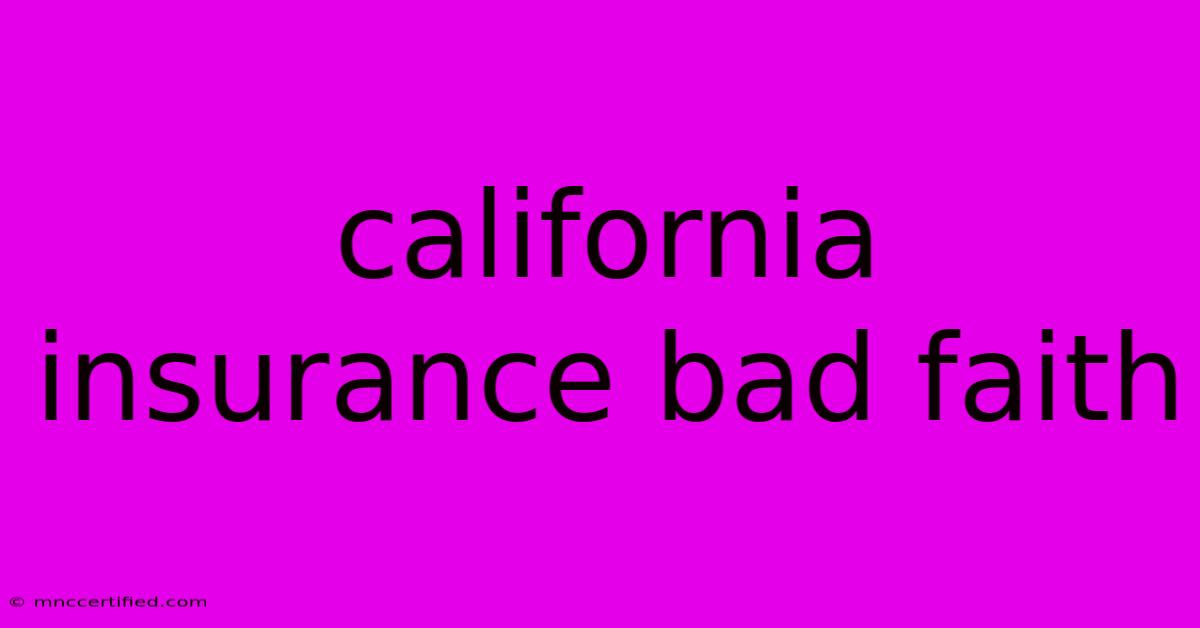California Insurance Bad Faith

Table of Contents
California Insurance Bad Faith: Understanding Your Rights and Recourse
California law holds insurance companies to a high standard of good faith and fair dealing when handling claims. When an insurer fails to meet this standard, it's considered insurance bad faith, a serious breach of contract that can lead to significant consequences. This article explores California insurance bad faith, outlining what it entails, how to identify it, and what recourse you have if you believe your insurer acted in bad faith.
What Constitutes Insurance Bad Faith in California?
Insurance bad faith in California isn't simply about denying a claim; it's about the manner in which the claim is handled. It involves unreasonable conduct by the insurer that violates the implied covenant of good faith and fair dealing inherent in the insurance contract. This can manifest in several ways, including:
-
Unreasonable Delay in Investigating or Processing a Claim: Prolonged delays without valid justification can be considered bad faith. This includes failing to promptly acknowledge receipt of a claim, neglecting to obtain necessary information, and unnecessarily delaying the investigation or payment of a legitimate claim.
-
Unreasonable Denial of a Claim: Denying a claim without a reasonable basis, lacking sufficient evidence, or ignoring relevant information constitutes bad faith. This often occurs when the insurer relies on flimsy pretexts to avoid paying a valid claim.
-
Failure to Properly Investigate a Claim: A superficial or inadequate investigation, failing to interview witnesses, or ignoring crucial evidence are all indicators of bad faith. Insurers have a duty to conduct a thorough and fair investigation.
-
Failure to Communicate Effectively: A lack of timely and clear communication with the insured, failing to respond to inquiries, or providing misleading information can demonstrate bad faith. Open and honest communication is key to a fair claims process.
-
Unfair Settlement Practices: Attempting to settle a claim for far less than its actual value, using high-pressure tactics, or engaging in deceptive practices during settlement negotiations can lead to bad faith claims.
-
Conflict of Interest: If an insurance adjuster has a personal stake in denying a claim, this can contribute to bad faith.
Identifying Potential Bad Faith: Red Flags to Watch For
Several red flags signal potential insurance bad faith in California:
- Ignoring your calls or emails: Lack of response to your attempts to contact your insurer.
- Requests for unnecessary documentation: Demanding excessive or irrelevant information to delay the claim process.
- Denial of a claim without explanation or evidence: Receiving a claim denial without a clear and justified explanation.
- Unreasonably low settlement offer: Receiving a settlement offer far below the actual value of your damages.
- Aggressive or dismissive behavior by the adjuster: Experiencing rude or uncooperative behavior from the insurance adjuster.
- Delaying payment beyond the policy's terms: Failure to pay a legitimate claim within a reasonable timeframe.
Recourse for Insurance Bad Faith in California
If you believe your insurer acted in bad faith, you have several options:
- File a complaint with the California Department of Insurance (CDI): The CDI can investigate your complaint and potentially take action against the insurer.
- Mediation or Arbitration: Consider mediation or arbitration to resolve the dispute outside of court.
- File a lawsuit: If other options fail, you can file a lawsuit against your insurer for breach of contract and bad faith. This can potentially result in significant damages, including compensatory damages for your losses, punitive damages to punish the insurer for its conduct, and attorney's fees.
Seeking Legal Counsel: When to Get Help
Navigating insurance bad faith claims can be complex. It is strongly recommended to seek legal counsel from a qualified California insurance bad faith attorney. An experienced attorney can assess your case, advise you on your legal options, and represent your interests throughout the process. They understand the intricacies of California insurance law and can help you maximize your chances of a successful outcome.
Disclaimer: This article provides general information about California insurance bad faith and is not a substitute for professional legal advice. Consult with an attorney to discuss your specific situation.

Thank you for visiting our website wich cover about California Insurance Bad Faith. We hope the information provided has been useful to you. Feel free to contact us if you have any questions or need further assistance. See you next time and dont miss to bookmark.
Featured Posts
-
Prince Insurance Gloucester Ma
Nov 27, 2024
-
Law Enforcement Life Insurance
Nov 27, 2024
-
Unc Fires Football Coach Mack Brown
Nov 27, 2024
-
Public Storage Insurance Claim
Nov 27, 2024
-
London Travel Alert Elizabeth Line Closure
Nov 27, 2024